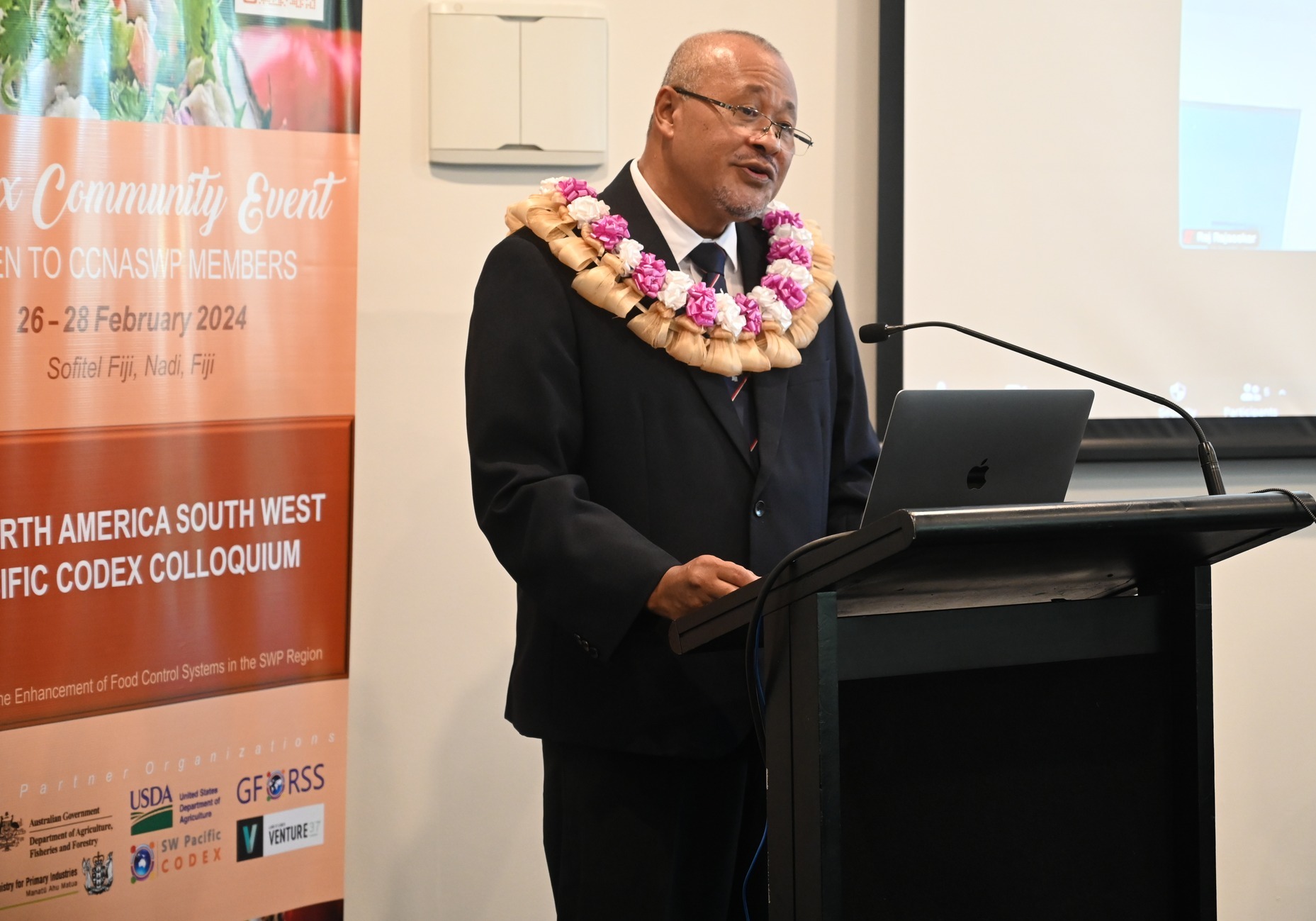CODEX COLLOQUIUM PARTICIPANTS HAPPY WITH OUTCOMES
February 29, 2024

The Permanent Secretary for Agriculture and Waterways and currently the Regional Coordinator for the Codex Committee for North America and the South West Pacific (CCNASWP) region, Dr Andrew Tukana applauded the participation of the representatives from the 14 member countries attending the 2nd CCNASWP Codex Colloquium meeting in Nadi over the last three days.
In a brief closing statement yesterday, Dr Tukana said that Fiji will play its role in executing consultative discussions with all the CCNASWP member countries in moving forward with the agenda that has been agreed on over the last three days and to ensure that everyone in the region contributes to food safety and fair trade practices according to the Codex standards.
Facilitator during the Colloquium, on Food Risk Analysis and Regulatory Policies, Professor Samuel Godefroy also serves as a founding member and Chief Operating Officer of the Global Food Regulatory Science Society (GFORSS), played an instrumental role during the past three days in ensuring that all member countries interacted and contributed during the information sharing and dialogue sessions.
“The objectives over the last three days were to review the needs of the region, identify priorities in food safety and quality, standard setting and mapping of food control systems focal points. Everyone has been interacting and coming up with plans and we now have an agenda as a way forward for a number of areas for collaboration,” explained Professor Godefroy.
“Some countries will be taking the lead role in developing the standards for certain commodities like breadfruit. Breadfruit is consumed around the region and has the potential to be traded in a big way outside the region as it can be processed into breadfruit gluten free flour.”
“We also agreed to develop standards for selected commodities and the CCNASWP member countries will be having consultations soon to draft the associated discussion papers to be presented to the relevant codex committees for approvals.”
“Collectively we will work together on the strategies agreed on and take the region’s position to the Codex Alimentarius Commission (CAC) in terms of food safety standards and fair trade practices.”
Fiji was represented by officers from the Ministry of Agriculture and Waterways and the Ministry of Health’s Food and Competent Authority Unit.
Fiji's relationship to Codex Alimentarius is referenced in the National Food Safety Legislation through which the Official Food Control Management is mandated and performed by the Competent Authority.
The Ministry of Health is the custodian of the Food Safety laws of Fiji and the food safety works having the Food Safety Act of 2003, the Food Safety Regulation of 2009 and the Food Establishment Grading Regulation of 2012.
The Food Unit and Competent Authority is tasked to oversee the overall food safety work in Fiji, covering both towns and city municipalities and all the health offices throughout Fiji.
Food safety work includes; food establishments licensing, inspections and auditing of food establishments such as restaurants, food processing facilities, and street vendors, etc.
It includes auditing of food production facilities against requirements of the Food Safety Laws and company food safety management systems, food control imports, export control food surveillance, food certifications (issuance of health certificate to exported food) and capacity building through training of inspectors and food industries on food safety laws and good hygienic practices.
The above activities by the Ministry of Health ensures the compliance of the industry to the food laws to protect the consumers, ensure public health and fair trade practices.
There are six Codex regions namely, Africa, Asia, Europe, Latin America and the Caribbean, Near East and the North America and South West Pacific.
The regions are each represented by a joint Food and Agriculture Organisation (FAO) and World Health Organisation (WHO) Regional Coordinating Committee.
Each committee is responsible for defining the problems and needs of the region concerning food standards and food control. By working collectively at the regional level, countries are able to highlight regulatory issues and problems arising from food control to strengthen food control infrastructures.
The next CCNASWP Colloquium meeting will take place in February 2025.
-ENDS-
